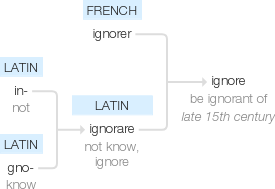Ignore
late 15th century (in the sense ‘be ignorant of’): from French ignorer or Latin ignorare ‘not know, ignore’, from in- ‘not’ + gno-, a base meaning ‘know’. Current senses date from the early 19th century.
wiktionary
From French ignorer, from Latin ignōrō(“to have no knowledge of, mistake, take no notice of, ignore”), from ignārus(“not knowing”), from in + gnārus(“knowing”), from gnōscō, nōscō; see know.
etymonline
ignore (v.)
1610s, "not to know, to be ignorant of," from French ignorer "be unaware of" (14c.), or directly from Latin ignorare "not to know, be unacquainted; take no notice of, disregard" (see ignorant). The original sense in English is obsolete. Sense of "pass over without notice, pay no attention to" in English first recorded 1801 (Barnhart says "probably a dictionary word"), and OED indicates it was uncommon before c. 1850. Related: Ignored; ignoring.
